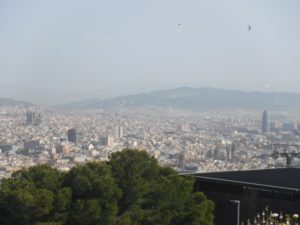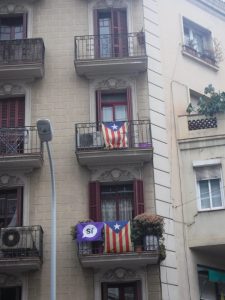
Barcelona is the largest city we’ve nested in to date. With a population of 1.6 million within the city limits, it’s the second largest city in Spain. However, the people in Barcelona would probably rather be identified as the largest city in Catalonia. Fiercely proud of their history, they are Catalans first, and only maybe Spaniards second.
Barcelona was a sleepy Roman town until it was conquered by the Visigoths in the 5th century, and for a brief moment, was the capital of all of Hispania. After being conquered by the Arabs in the 8th century and ruled by Charlemagne’s son, the counts of Barcelona grew powerful because of a large trading network. It developed its own language and culture. The marriage of Ferdinand II of Aragon and Isabella I of Castile in 1469 joined Spain and Catalonia. Barcelona remained in Spanish hands except for a brief annexation by Napoleon in 1812. It grew as an industrial city, most notably in the textile trade. In 1897, the city finally burst through its ancient walls and a new area, the Eixample was built. Brilliant art nouveau and modernista architects gave the city it’s unique flavor during this time of expansion.
In 1929, Barcelona hosted the Barcelona Exhibition, which revitalized the area around Placa Espanya and began the building of its world-class metro.
In July 1936, Franco’s coup started the Spanish Civil War. Barcelona resisted the coup, was repeatedly bombed, and finally fell into Franco’s hands the following January. Catalan language and culture were suppressed. Still, because of industrial jobs, there was a mass migration into the area, mostly from the countryside, swelling the city’s population dramatically in just ten years. City services were stretched to the maximum, and living conditions were bleak.

The death of Franco in 1975 was celebrated throughout the city, and it immediately began to regain its Catalan culture and history. Schools are now taught in Catalan, and it’s the primary language in the streets. In 1992, Barcelona hosted the Summer Olympics, which sparked a huge urban development in the city. Over three miles of beaches were built and as a result of the publicity of the Olympics and the revitalization of the city, it has become a major tourist destination. It now has seven major docks for cruise ships, allowing an influx of over 20,000 visitors a day by cruise ship alone.
Today Barcelona is fiercely proud of its Catalan history and culture. There is a strong pro-independence movement in Catalonia, but many people have told us that their concern is respect and a fair tax structure from Madrid. Time will tell if this fascinating region will become its own nation or will remain a part of Spain.3